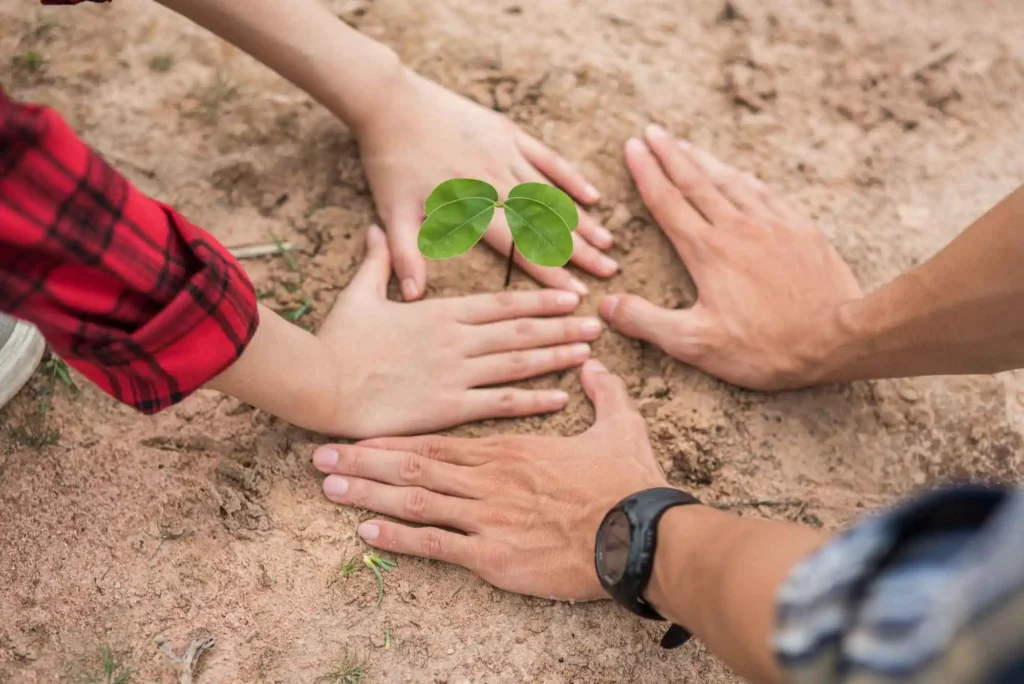Learn how nature can boost your well-being in 7 amazing ways, from reducing stress to improving health. Plus, get tips on how to enjoy nature more everyday.
Contents
- 1 Introduction:
- 2 1. Nature reduces stress and anxiety
- 3 2. Nature enhances mood and self-esteem
- 4 3. Nature boosts creativity and problem-solving
- 5 4. Nature improves physical health and fitness
- 6 5. Nature fosters social connection and cooperation
- 7 6. Nature promotes personal growth and development
- 8 7. Nature restores balance and harmony
- 9 Conclusion
- 10 FAQ
Introduction:
Do you feel stressed, anxious, or depressed? Do you struggle with low mood, self-esteem, or creativity? Do you suffer from poor health, fitness, or immunity? If you answered yes to any of these questions, you may benefit from spending more time in nature.
You probably already know that spending time in nature can help you produce more vitamin D, which is essential for your bone, muscle, and immune health. But did you know that there are many other benefits of spending time in nature that go beyond vitamin D? In fact, spending time in nature can have a profound and positive impact on your well-being, both physically and mentally.
In this article, we will go beyond the obvious benefit of vitamin D and discover seven other reasons why spending time in nature makes you feel amazing. We will also provide some practical tips on how to incorporate more nature into your daily life, no matter where you live or how busy you are.
1. Nature reduces stress and anxiety

One of the most immediate and noticeable effects of spending time in nature is the reduction of stress and anxiety. This is because nature triggers the release of endorphins, serotonin, and dopamine, which are neurotransmitters that make us feel happy, calm, and relaxed. Additionally, nature helps us to disconnect from the sources of stress in our modern lives, such as work, social media, and news.
According to a study by the University of Michigan, participants who took a 20-minute walk in a natural setting reported lower levels of stress and anxiety than those who walked in an urban setting. Similarly, a study by the University of Exeter found that people who lived near green spaces had lower levels of mental distress and higher levels of life satisfaction than those who lived in more built-up areas.
Some tips to reduce stress and anxiety with nature are:
- Take a break from your screen and go outside for at least 20 minutes a day. You can walk, bike, or jog in a park, garden, or forest, or simply sit and enjoy the view.
- Bring some nature indoors by adding plants, flowers, or natural scents to your home or office. You can also use nature sounds, such as birdsong, water, or wind, to create a relaxing atmosphere.
- Plan a weekend getaway or a vacation to a natural destination, such as a lake, mountain, or beach. You can also join a nature-based retreat or a camping trip to immerse yourself in nature for a longer period of time.
2. Nature enhances mood and self-esteem

Another benefit of spending time in nature is that it can enhance our mood and self-esteem. This is because nature can evoke positive emotions, such as joy, gratitude, and awe, which are linked to happiness and well-being. For instance, when we see a beautiful sunset, a blooming flower, or a majestic mountain, we may feel a sense of wonder, appreciation, and connection with something greater than ourselves. These emotions can also boost our self-esteem, as they make us feel more confident, optimistic, and resilient.
According to a study by the University of Derby, participants who engaged in nature-based activities, such as gardening, birdwatching, or hiking, for 30 days reported significant improvements in their mood and self-esteem. Similarly, a study by the University of California, Berkeley, found that participants who watched awe-inspiring videos of nature experienced more positive emotions and less negative emotions than those who watched neutral or humorous videos.
Some tips to enhance mood and self-esteem with nature are:
- Practice mindfulness in nature by paying attention to your senses, feelings, and thoughts. You can also use nature as a source of inspiration, reflection, or gratitude. For example, you can write a poem, draw a picture, or keep a journal about your experiences in nature.
- Share your nature experiences with others by taking photos, videos, or stories and posting them on social media, or by inviting your friends, family, or colleagues to join you in nature. You can also join a nature club, group, or community to meet new people who share your interest in nature.
- Challenge yourself in nature by trying new or difficult activities, such as climbing, kayaking, or skiing. You can also set goals, track your progress, or reward yourself for your achievements in nature. For example, you can aim to visit a new park, hike a longer trail, or plant a new flower every week.
3. Nature boosts creativity and problem-solving

A third benefit of spending time in nature is that it can boost our creativity and problem-solving skills. This is because nature can stimulate our brain activity, enhance our attention span, and facilitate divergent thinking. For instance, when we are in nature, we are exposed to novel and complex stimuli, such as sounds, smells, and shapes, which can activate different parts of our brain and spark new ideas.
Moreover, nature can help us to focus better, as it reduces the distractions and interruptions that often impair our concentration. Furthermore, nature can encourage us to think outside the box, as it offers us multiple perspectives and possibilities to explore.
According to a study by the University of Utah, participants who spent four days in nature without any electronic devices performed 50% better on a creative problem-solving test than those who stayed in the city. Similarly, a study by the University of Kansas found that participants who hiked in nature for three days showed significant improvements in their attention span and memory.
Some tips to boost creativity and problem-solving with nature are:
- Use nature as a source of inspiration, stimulation, or relaxation for your creative projects, such as writing, painting, or music. You can also use nature as a material, tool, or canvas for your creations, such as making sculptures, collages, or murals with natural objects.
- Use nature as a context, challenge, or solution for your problem-solving tasks, such as puzzles, games, or experiments. You can also use nature as a model, mentor, or partner for your problem-solving processes, such as observing, learning, or collaborating with nature.
- Use nature as a catalyst, trigger, or reward for your creative and problem-solving habits, such as brainstorming, testing, or evaluating. You can also use nature as a feedback, support, or motivation for your creative and problem-solving outcomes, such as receiving, sharing, or celebrating your results.
4. Nature improves physical health and fitness

A fourth benefit of spending time in nature is that it can improve our physical health and fitness. This is because nature can provide us with fresh air, sunlight, and natural elements, which can benefit our respiratory, cardiovascular, and immune systems. For instance, when we breathe in fresh air, we inhale more oxygen and exhale more carbon dioxide, which can improve our lung function and blood circulation.
Moreover, when we are exposed to sunlight, we produce more vitamin D, which can strengthen our bones, teeth, and muscles. Furthermore, when we interact with natural elements, such as soil, plants, and animals, we expose ourselves to beneficial bacteria, fungi, and viruses, which can enhance our immune system and protect us from diseases.
According to a study by the University of Illinois, participants who spent time in natural settings had lower levels of inflammation, blood pressure, and cholesterol than those who spent time in urban settings. Similarly, a study by the University of East Anglia found that people who lived near green spaces had lower rates of mortality and morbidity from various chronic diseases, such as diabetes, heart disease, and stroke.
Some tips to improve physical health and fitness with nature are:
- Engage in physical activities in nature, such as walking, running, cycling, or swimming. You can also try more adventurous or fun activities, such as zip-lining, rafting, or surfing. You can also join a nature-based fitness program, such as yoga, tai chi, or boot camp.
- Eat healthy foods from nature, such as fruits, vegetables, nuts, or seeds. You can also grow your own food, such as herbs, spices, or sprouts. You can also forage for wild food, such as berries, mushrooms, or greens.
- Use natural remedies from nature, such as herbs, oils, or teas. You can also make your own remedies, such as salves, tinctures, or syrups. You can also seek professional help from a natural healer, such as an acupuncturist, a homeopath, or a naturopath.

A fifth benefit of spending time in nature is that it can foster social connection and cooperation. This is because nature can enhance our empathy, compassion, and altruism, which are essential for building and maintaining healthy relationships. For instance, when we observe and appreciate the diversity and interdependence of life in nature, we may feel more connected and empathetic towards other living beings, including humans.
Moreover, nature can create opportunities for meaningful interactions and shared experiences with others, such as family, friends, or strangers. For example, when we go for a hike, a picnic, or a camping trip with others, we can bond over the common challenges, joys, and memories that nature offers us.
According to a study by the University of Rochester, participants who were exposed to natural images and sounds reported higher levels of empathy, compassion, and generosity than those who were exposed to artificial images and sounds. Similarly, a study by the University of British Columbia found that participants who participated in nature-based activities with others, such as gardening, birdwatching, or kayaking, reported higher levels of social well-being and satisfaction than those who participated in indoor activities with others, such as cooking, reading, or playing games.
Some tips to foster social connection and cooperation with nature are:
- Invite your loved ones to join you in nature by suggesting some fun and easy activities that you can do together, such as a walk, a picnic, or a game. You can also surprise them with a gift or a card that shows your appreciation and invites them to spend some time with you in nature.
- Plan a special occasion or a celebration in nature, such as a birthday, an anniversary, or a holiday. You can choose a natural destination that suits your preferences and budget, such as a park, a garden, or a beach. You can also prepare some food, drinks, and decorations that match the theme and mood of the occasion.
- Join or create a community or a group that shares your interest in nature, such as a nature club, a hiking group, or a gardening society. You can meet new people, make new friends, and learn new skills by participating in nature-based activities, events, or projects. You can also support and help each other by sharing your experiences, insights, and resources.
6. Nature promotes personal growth and development

A sixth benefit of spending time in nature is that it can promote personal growth and development. This is because nature can challenge our physical and mental abilities, expand our horizons, and inspire us to learn and grow. For instance, when we engage in outdoor activities, such as hiking, biking, or climbing, we can test and improve our physical strength, endurance, and coordination.
Moreover, when we encounter new and unfamiliar situations, such as different weather conditions, terrain, or wildlife, we can stimulate and sharpen our cognitive skills, such as memory, attention, and problem-solving. Furthermore, when we explore and discover new places, cultures, and perspectives, we can broaden our knowledge, curiosity, and appreciation of the world and ourselves.
According to a study by the University of Colorado, participants who spent three weeks in an outdoor education program showed significant improvements in their self-confidence, self-efficacy, and self-awareness. Similarly, a study by the University of Minnesota found that participants who traveled to different natural environments, such as forests, mountains, and oceans, reported higher levels of openness, conscientiousness, and agreeableness than those who stayed in their familiar surroundings.
Some tips to promote personal growth and development with nature are:
- Use nature as a source of inspiration, stimulation, or relaxation for your personal projects, such as learning a new skill, pursuing a hobby, or achieving a goal. You can also use nature as a resource, guide, or mentor for your personal processes, such as planning, executing, or evaluating your projects.
- Use nature as a context, challenge, or solution for your personal tasks, such as studying, working, or volunteering. You can also use nature as a model, example, or partner for your personal skills, such as communication, leadership, or teamwork.
- Use nature as a catalyst, trigger, or reward for your personal habits, such as reading, writing, or meditating. You can also use nature as feedback, support, or motivation for your personal outcomes, such as learning, growth, or fulfillment.
7. Nature restores balance and harmony

A seventh and final benefit of spending time in nature is that it can restore balance and harmony in our lives. This is because nature can align our biological rhythms, values, and actions with the natural cycles, patterns, and principles of nature. For instance, when we follow the natural rhythms of the sun, moon, and seasons, we can regulate our sleep, mood, and energy levels.
Moreover, when we adopt the natural values of simplicity, sustainability, and diversity, we can reduce our ecological footprint, conserve our resources, and celebrate our differences. Furthermore, when we emulate the natural actions of adaptation, cooperation, and resilience, we can cope with change, collaborate with others, and overcome adversity.
According to a study by the University of Surrey, participants who adjusted their sleep patterns according to the natural light-dark cycle reported better sleep quality, mood, and cognitive performance than those who followed their usual artificial schedules. Similarly, a study by the University of California, Berkeley, found that participants who engaged in nature-based practices, such as meditation, yoga, and gardening, reported higher levels of happiness, health, and harmony than those who engaged in conventional practices, such as watching TV, shopping, and driving.
Some tips to restore balance and harmony with nature are:
- Follow the natural rhythms of the day and the year, such as waking up and going to bed with the sun, eating seasonal and local foods, and celebrating natural events, such as solstices, equinoxes, and full moons.
- Adopt the natural values of nature, such as simplicity, sustainability, and diversity, in your lifestyle choices, such as buying less and reusing more, using renewable and organic products, and respecting and appreciating different cultures, beliefs, and opinions.
- Emulate the natural actions of nature, such as adaptation, cooperation, and resilience, in your life challenges, such as changing your habits, working with others, and facing difficulties.
Conclusion
In conclusion, spending time in nature can have a profound and positive impact on our well-being. As we have seen, nature can reduce our stress and anxiety, enhance our mood and self-esteem, boost our creativity and problem-solving, improve our physical health and fitness, foster our social connection and cooperation, promote our personal growth and development, and restore our balance and harmony.
So, what are you waiting for? Grab your backpack, your sunscreen, and your water bottle, and head out to the nearest park, forest, or beach. Or better yet, plan a trip to a new and exciting natural destination. You will not only have a great time, but you will also feel amazing. And don’t forget to share your experiences and insights with us in the comments section below. How do you spend time in nature? What benefits do you notice? How do you incorporate more nature into your daily life? We would love to hear from you.
FAQ
Here are some frequently asked questions and answers about spending time in nature and its benefits:
- Q: How much time in nature do I need to feel the benefits?
A: There is no definitive answer to this question, as different people may have different needs and preferences. However, some studies suggest that spending at least 120 minutes a week in nature can have significant benefits for your well-being. You can divide this time into smaller chunks, such as 20 minutes a day, or longer sessions, such as a weekend getaway. The important thing is to find a frequency and duration that works for you and your lifestyle.
- Q: What if I live in a city or a place with limited access to nature?
A: You don’t need to travel far or spend a lot of money to enjoy nature. You can find nature in your own neighborhood, such as a park, a garden, or a tree. You can also bring nature into your home or office, such as plants, flowers, or natural scents. You can also use technology, such as nature sounds, videos, or virtual reality, to simulate nature. However, these are not substitutes for the real thing, so try to visit natural places whenever you can.
- Q: What are some of the best activities to do in nature?
A: There are many activities that you can do in nature, depending on your interests, abilities, and goals. Some of the most popular and beneficial activities are walking, hiking, biking, swimming, camping, gardening, birdwatching, and photography. You can also try more adventurous or fun activities, such as zip-lining, rafting, surfing, skiing, or snowboarding. You can also join a nature-based fitness program, such as yoga, tai chi, or boot camp. The important thing is to choose an activity that you enjoy and that suits your level of fitness and comfort.
